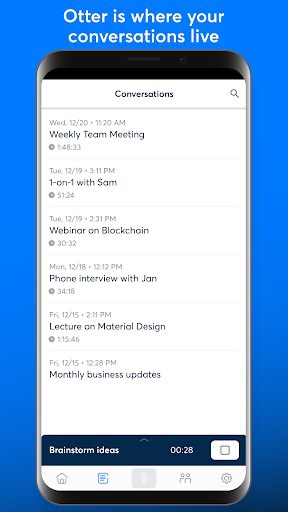


“The fact that these AI-powered services exist and can turn a couple hours of audio into a reasonable written transcript often in a matter of minutes is a complete game changer,” Susan McGregor, researcher at Columbia University’s Data Science Institute, said of transcription apps. That’s an overlooked vulnerability that puts data and sources at risk, say experts. And even savvy, skeptical journalists who take robust efforts to protect sources have found themselves in the thrall of Otter, a transcription app powered by artificial intelligence, and which has virtually eliminated the once-painstaking task of writing up interview notes. We allow Google maps access to our location, even though we know it leaves an indelible digital trail. We know Facebook sells our data, but we still post baby pictures. We make privacy versus utility tradeoffs all the time with our tech. In the three months since that initial exchange (and there was more to come), I’ve gone down the rabbit hole - talking to cybersecurity experts, press freedom advocates and a former government official - to try and understand what vulnerabilities and risks are present in this app that’s become a favorite among journalists for its fast, reliable and cheap automated transcription. An initial confirmation that the survey was legitimate was followed by a denial from the same Otter representative, laced with a warning that I “not respond to that survey and delete it.” My communications with Otter were all restricted to email and were sporadic, often confusing and contradictory. I contacted Otter to verify if this was indeed a real survey or some clever phishing ruse. Was this a phishing attack? Was Otter or some entity that had access to Otter’s servers spying on my conversations? Three responses were offered: “Personal transcription,” “Meeting or group collaboration,” and “Other.” It read: “Hey Phelim, to help us improve your Otter’s experience, what was the purpose of this particular recording with titled ‘Mustafa Aksu’ created at ‘ 11:02:41’?” The next day, I received an odd note from Otter.ai, the automated transcription app that I had used to record the interview.

So when I talked to Aksu in November, I made sure to use Signal, an encrypted phone app, to protect our discussion about psychological trauma afflicting Uyghurs overseas. When four family members died in succession in recent years, a heartbroken Aksu refrained from calling home to ask about the circumstances of their deaths to shield relatives from potentially dangerous state scrutiny for having overseas ties. The Chinese government’s pervasive surveillance of Xinjiang’s Muslim Uyghur population makes any contact Uyghurs have with friends and relatives overseas a potential red-flag for police scrutiny.


 0 kommentar(er)
0 kommentar(er)
